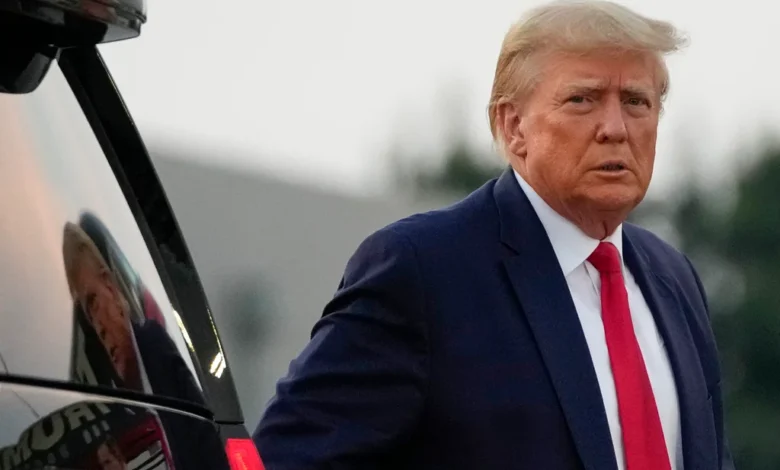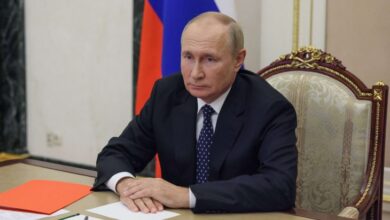The basic problem with putting Trump on trial

In his 1987 novel about a high-profile criminal trial in New York City, author Tom Wolfe has one of the lead characters, Assistant District Attorney Larry Kramer, share an open secret about how juries are selected: “You get people who come into the jury box with their minds – how should I say it? – set in a certain way. There’s a lot of Us versus Them.”
In “The Bonfire of the Vanities,” the big dividing line was race. In this week’s mammoth New York trial of former President Donald Trump on charges of falsifying business records in connection to hush money paid to an adult film star, the yawning gap between “Us” and “Them” is along partisan lines.
That dynamic has already reared its head, as at least 50 jurors – representing more than half of the first group of prospective jurors – were dismissed on the first day of jury selection Monday because they said they couldn’t be impartial. The mass dismissal underscores the difficulty of finding acceptable jurors and is just the first obstacle facing the unprecedented prosecution of a former president that will leave a bad taste in many voters’ mouths from the unmistakable political undertones.
It should come as no surprise that it will be hard to find jurors who don’t bring strong political predispositions to bear given that the motivation for bringing this case looks to be so transparently political. The circus that is the first-ever criminal trial of a former president illustrates why this particular case may have been a poor choice to break that precedent.
Though seven were sworn in on Tuesday, there were still illustrations of the problems of a politicized jury pool. One potential juror who underwent questioning, for instance, was subsequently struck for cause after Trump’s team found social media posts from the juror referencing Trump that say, “Get him out” and “Lock him up.”
Indeed, it seems unlikely that this case would be being prosecuted with the same vigor and creative legal theorizing if Trump were an everyday citizen. After all, Manhattan District Attorney Alvin Bragg came into office promising to focus on the ongoing investigation of Trump, and would have likely felt political heat from New York Democrats had he decided to close the investigation without bringing charges.
In the end, as The New York Times reported in March 2023, Bragg’s office took a “circuitous and sometimes uncertain road” to filing criminal charges, reviving a dying investigation that originally focused on Trump’s business practices with a renewed focus on hush money payments.
To Bragg’s supporters, it’s a mark of his diligence and fortitude that he left no stone unturned. To his detractors, the drawn-out investigation, seeming to pivot from one potential crime to another, gives the impression of a DA looking for a crime to pin on an unfavored individual. (Trump has pleaded not guilty.)
After all, making hush money payments, as Trump is alleged to have done with former adult film actress Stormy Daniels, isn’t illegal. Instead, the case is built around a rather aggressive interpretation of the relevant statutes: In his records, Trump recorded his reimbursement to former “fixer” Michael Cohen, who handled the Daniels payment, as a legal expense. This deception would normally be considered a misdemeanor offense in New York state.
But Bragg, unwilling to let Trump off the hook easily, is hinging his case on the allegation that this misdemeanor offense was in service of a violation of federal campaign finance laws. The Federal Election Commission opted not to charge Trump with a violation of election law on this front, with two Republican commissioners noting that Cohen had already pleaded guilty in relation to the alleged violation, and further government action “was not the best use of resources.”
Another problem, as National Review’s Andrew McCarthy has pointed out, is that Bragg, a state prosecutor, is seeking to enforce a federal statute, bringing this case against an offense “that the feds themselves did not believe Trump committed, and that Bragg is politically engineering into a new election law of his very own.”
Not that Trump is blameless in this. Trump’s manifest character flaws and history of shady dealings are being highlighted, once again, by a trial that includes the phrases “hush money” and “porn star.” And even while this case faces significant legal scrutiny from lawyers and legal commentators, his other pending trials, such as his handling of classified materials at his Mar-a-Lago home or his attempt to bully Georgia election officials in 2020, do run a much stronger risk of placing him in serious legal danger.
In a sense, it’s hard to blame the jurors who feel they can’t be impartial. For decades, Trump has been a fixture on our airwaves, social media sites and political coverage. And his well-documented celebrity, outrageous social media posts and charged political rhetoric make him a challenge for even the most sober-minded juror to treat as an individual rather than a politician.
Trump also has an unquestioned ability to push his supporters to defend the indefensible, even as he induces his opponents to stretch the envelope in their attempts to derail his candidacy. As such, no matter how the current trial is resolved, it will emphasize yet again how Republicans could – and, I would argue, should – have picked a presidential nominee with less baggage.
But they didn’t, and now many are feeling a rally-round-the-flag effect in what is likely the first and potentially only Trump criminal case that’s going to trial before Election Day.
If Democrats are so willing to come up with creative legal theories to keep him out of office, some voters may think that all their rhetoric about “constitutional norms” wasn’t as high-minded as it sounded.
The recent Supreme Court decision unanimously striking down Colorado’s attempt to remove Trump from the ballot was a reminder that too-cute attempts to keep Trump out of the White House can backfire. And the flimsiness of the hush money case will allow Trump’s supporters to downplay the seriousness of the other charges against him, making it less likely that they will have a significant political impact in November.
Bragg’s decision to bring this case, with its attenuated connection to an actual crime, can’t be taken out of its political context. The weakness of this case muddies the water for future efforts to attack Trump’s more egregious conduct. The jury selection and following court maneuverings will highlight how strong the disagreements are between “Us” and “Them.” And Trump’s ability to push both his supporters and his detractors past the bounds of normal political battles, and to pull out all the stops to win, will remain unparalleled.





